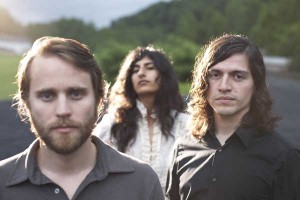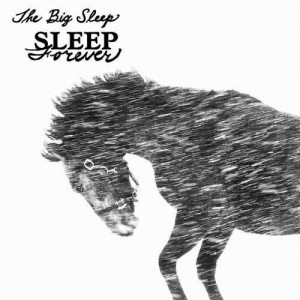 Clear-headed ‘ideas man’ Danny Barria is quick to acknowledge his Jersey roots. A graduate of Morris Catholic High School, the Dover native’s strict mother demanded he get a weekend job to keep busy. But at night, the curious Brit-pop admirer obsessively learned guitar. At 18, Barria headed to Philadelphia, attended college, and met future band mate Sonya Balchandani (bass-vocals). Upon moving to Manhattan’s increasingly expensive East Village thereafter, the pair got serious about both musical and personal endeavors. Now living in the more affordable Greenpoint section of Brooklyn, The Big Sleep’s frontline has begun touring in support of Sleep Forever (Frenchkiss Records), an ambitiously stirring sophomore breakthrough.
Clear-headed ‘ideas man’ Danny Barria is quick to acknowledge his Jersey roots. A graduate of Morris Catholic High School, the Dover native’s strict mother demanded he get a weekend job to keep busy. But at night, the curious Brit-pop admirer obsessively learned guitar. At 18, Barria headed to Philadelphia, attended college, and met future band mate Sonya Balchandani (bass-vocals). Upon moving to Manhattan’s increasingly expensive East Village thereafter, the pair got serious about both musical and personal endeavors. Now living in the more affordable Greenpoint section of Brooklyn, The Big Sleep’s frontline has begun touring in support of Sleep Forever (Frenchkiss Records), an ambitiously stirring sophomore breakthrough.
Appropriating the appellation of Raymond Chandler’s ominously noir detective novel (adapted to the big screen in 1946 and starring Humphrey Bogart and Lauren Bacall), The Big Sleep evokes similar perilous uneasiness. Their recondite sepia-toned post-midnight milieu comparatively forges a disturbingly penetrating phantasmagoria, seizing enlightened intimacy from chaotic noise.
At Mercury Lounge late February, The Big Sleep shoots for a big, dramatic opening, delivering the ruminating piano-plinked mystical revelation, “Chorus Of Guitars,” under contrasting ellipsoidal light shading. Fulltime drummer, Gabe Rhodes, recovering from a fractured arm, one-handedly hits toms and snares, yielding regular percussive duties to propitious band friend, David Jack Daniels. Despite the extended troika’s quietly reserved aloofness, modest eloquence, and calculated performance, an ascending cathartic rage seeps into their stalwart instrumentation. Put across with precision-tooled efficacy, The Big Sleep’s doggedly determined, yet controlled, interplay absorbs a dependably stylish admixture of metallic wallops, psychedelic dollops, shoegaze bullocks, and prog-rock polyps.
 So it goes for Sleep Forever, as the game trio revels in eruptive torrents of lofty guitar maelstroms, truculent bass patterns, and tempestuous drum thumps, devising a completely nourishing, endlessly mind-numbing assault juxtaposing recurrent tranquil diversions. Fuzzy guitar inundates bombarding bass for brazed grunge-y firearm, “The Big Guns,” while buzzing six-string distortion nearly drowns out Balchandani’s apprehensive lyrical paranoia fogging boisterously plasmatic extemporization, “Bad Blood.”
So it goes for Sleep Forever, as the game trio revels in eruptive torrents of lofty guitar maelstroms, truculent bass patterns, and tempestuous drum thumps, devising a completely nourishing, endlessly mind-numbing assault juxtaposing recurrent tranquil diversions. Fuzzy guitar inundates bombarding bass for brazed grunge-y firearm, “The Big Guns,” while buzzing six-string distortion nearly drowns out Balchandani’s apprehensive lyrical paranoia fogging boisterously plasmatic extemporization, “Bad Blood.”
Likewise, Barria’s murkily laconic verbalized drone struggles to rise above the wrenching din of curdled flounce, “Pinkies.” And rock solid instrumental blazer, “Undying Love,” seriously scuffs up the frantic rhythmic baluster. Yet it’s the exhilaratingly bass-boomed Sonya-sung sonic cannonball, “Tigers In Our Hearts,” that most impressively impacts auricular perception, climaxing resolutely with a tantalizingly effectual cadenced punctuality closer to Led Zeppelin’s capacious metallurgic blast than the Pixies decisively bristling aggro-pop dissonance. Look for The Big Sleep to breakout and have it all in ’08, y’all – just like Bogie and Bacall.
I spoke to Barria via cell phone while he was stuck on line at the DMV.
How does The Big Sleep’s formative ’06 debut, Son Of The Tiger, differ from the recondite Sleep Forever?
BARRIA: We were younger, 25, at the time. I love the record, but it’s ‘of its time.’ It took three years to finish and half a year to come out. In that time, we wrote those songs. But since we met Gabe in 2004, we’ve matured quicker. He brought a certain intrinsic element and we became more locked in. We had two other drummers. At the Mercury show, David Jack Daniels (of local band, Levy) filled in since Gabe broke his arm a few weeks earlier. We seem to have drummer voodoo. We were in non-stop practice with David for that record release party.
The live show was nearly flawless, quite sterling actually, in my humble opinion.
There were missed, flubbed notes. (he laughs) We now use lights to make the show visually distinctive.
Who were your main primordial influences?
The Cure was my first love. They were the original band I was obsessed with when learning guitar at age fifteen. Brit pop bands Suede and the Verve are influences, but high above them is Led Zeppelin. A lot of people say we remind them of My Bloody Valentine, Sonic Youth, and Black Sabbath. While I love them, I don’t listen to them nearly as much.
What’s with the somnambulant album title, Sleep Forever?
It’s basically meant to be ‘us forever.’ There are a few different reasons for it. Gabe had twin sons last year and things are happening really fast now. This record captures a snapshot, a picture, of us at this moment.
“Bad Blood” sounds like a wild improvisation given a solid foundation afterwards.
I came up with a big riff, brought it to practice, and hammered it out in one week. Conversely, there’s “Organs,” which we had for three years and never played it out because it was not up to snuff. Then, we got that extra essential part and that’s when we knew it was done. Sometimes things fall out of the sky and into your lap, other times it’ll be worked at ‘til it’s right. “Tigers In Our Hearts” started with a chorus-y riff, then I worked on the verses for awhile. I’m a World War II buff and I was reading a book about racism during the war and they had words for an ancient Japanese war song. They were taken for that aggressive in-your-face guitar song. “Undying Love” was an almost cock-rock song so we named it something not at all what you’d expect.
The solemn acoustic lullaby, “Little Sister” was supposedly written as an ode to your younger sister.
She lived alone in Boston and got sick once and I was visiting the hospital for a week. It was sad to see my sister, whom I love, having a tough time. She’s way better now. I’m sure I took it harder than she did but I couldn’t help her in anyway and felt terrible.
The expansive Brooklyn scene has spread beyond the artsy punk heaviosity of the last few years. How do you see Big Sleep fitting in?
I wouldn’t call it a focused scene. The musicians I like and am friendly with are very different than us. Dirty On Purpose are doing real well but they’re pretty poppy. But I want to get away from that ‘heaviosity’ a little if it’s possible.
How are your newer tracks, slated for future endeavors, coming along?
I feel the unrecorded songs may have less distortion and more variety. The songs are already pretty rhythm based, but I want to scale back on the guitar-in-your-face all the time. We’ve been loud and heavy for awhile so I want to bring in some more melodies. For me, it starts with the music instead of the lyrics. I’m making room for vocals but I don’t know how they’ll change our overall sound. There’s a somber, almost dour mood, I want to change for more uppity, happy tunes. It’s not necessarily conscious, but it’s worth aiming for.
Many tracks have psychedelic components such as resonant reverb, flailing chords, and trippy undertones. Do you ever compose or arrange any tracks under the influence of recreational drugs?
No. I use no artificial intelligence. (laughter) There’s no altered inspiration. That may change, but not for now.